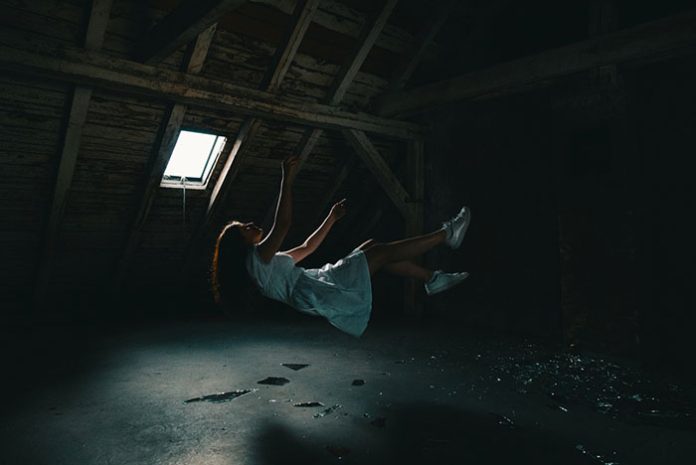The clock struck 3 am! It has been hours since you went to bed. Yet you are lying wide awake with tired eyes, tossing and turning in bed. This brings up the question, how long does it take to fall asleep?
According to Dr. Michelle Drerup from the Cleveland Clinic:
“Most people need about five to 20 minutes to fall asleep. But this is just an average. Everyone is different.”
-Dr. Michelle Drerup
These numbers vary from person to person and from day-to-day. It is normal to have an occasional sleepless night. But, if problems falling asleep appear frequently, this is an alarming situation.
Taking too little or too much time to fall asleep might indicate underlying problems, such as insomnia. Studies show a strong relationship between quality of sleep and how long it takes to fall asleep. If you cannot sleep even after being in bed for hours, read on to find ways to fall asleep easier.
Sleep Latency: How Long Does It Take To Fall Asleep?

Sleep latency is a medical term used to describe how long it takes you to fall asleep. It is measured from the moment lights are out to when electroencephalography (EEG)- a machine measuring brain waves- shows signs of sleep.
Doctors and researchers record sleep latency during polysomnography (an overnight sleep study) and multiple sleep latency tests (MSLT). It determines if a person has a sleep disorder, such as narcolepsy or insomnia.
According to the National Sleep Foundation, an adult may sleep about 7-9 hours a night. Teenagers usually get 8 to 10, whereas kids need up to 11 hours of sleep. Preschoolers, toddlers, and infants need even more sleep time.
Usually, an adult takes 10 to 20 minutes to fall asleep. If you hit the dreamland too quickly or too late, it is a cause of concern.
Reasons You Are Unable To Get A Good Night’s Sleep
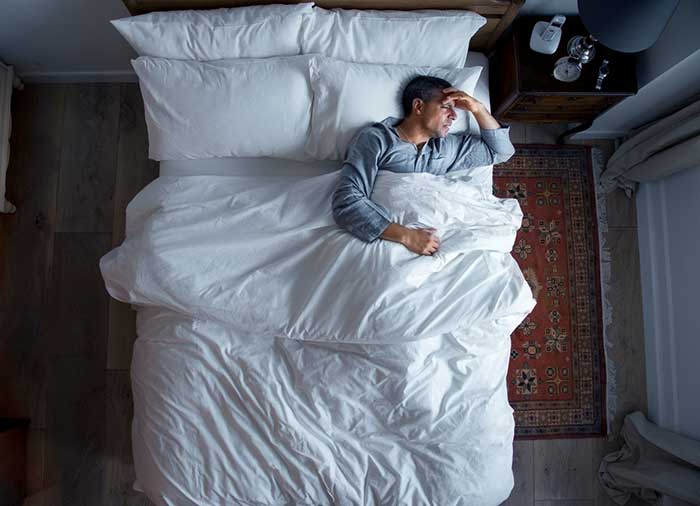
Waking up at 3 am, you might be asking yourself, why do I wake up in the middle of the night?
Several reasons might be getting in your way of peaceful sleep. These may include:
Circadian Rhythm
Circadian rhythm might be one of the reasons you are tossing in bed for an hour. Humans have a natural biological rhythm, also known as circadian rhythm. It is a 24-hour cycle that tells your body when it is time to eat, sleep, drink, and more.
Everyone has their own unique biological clock. Some people prefer to lay down early, while some are night owls. If you are a night person, your bedtime might be sometime later. If you have gone to bed earlier than usual, you may have trouble falling asleep quickly.
Poor Sleep Hygiene
Having poor sleep hygiene is the worst thing you can do to your sleep. Consuming nicotine, caffeine, or alcohol closer to bedtime hinders your sleep quality. Eating late at night, eating a lot, or not eating at all impacts your sleep time negatively.
Not adhering to your bedtime and not keeping your bedroom sleep-friendly also come under poor sleep hygiene.
“When you go to bed affects how long you can sleep, no matter how tired you are.”
-Elizabeth Klerman (head of the Analytic and Modeling Unit of Sleep and Circadian Disorders division at Brigham and Women’s Hospital).
Using electronic devices, such as mobiles, before bedtime affects sleep. Study shows that electronic devices are the main reason toddlers have trouble falling asleep.
Underlying Sleep Disorders
Another reason you are unable to fall asleep fast may be sleeping conditions. Insomnia, narcolepsy, and sleep apnea are common sleep disorders that can disrupt your sleep pattern. They might occur randomly or due to other health conditions or medications. If you are facing difficulty falling asleep, consult a doctor.
Easy Methods To Fall Asleep Fast!
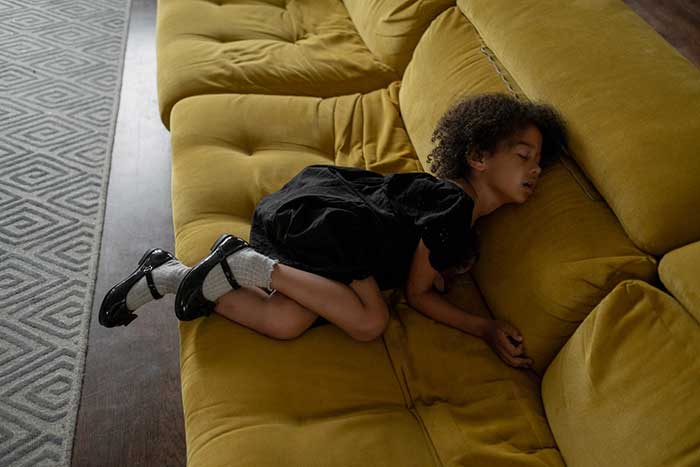
Want to know how to fall asleep in 10 seconds? Read on!
The Military Method
This method was first popularized in the book “Relax and Win: Championship Performance.” World War II soldiers used this method to fall asleep in two minutes through these steps:
Related Book
- Relax your entire face, including the forehead, eyelids, jaw, and tongue.
- Release the tension from your shoulders. Drop your hands to either side of your body.
- Inhale and exhale to relax your chest.
- Relax your legs, from thighs to calves to ankles and feet.
- Imagine relaxing scenery to calm down your mind. If it does not come naturally, tell yourself, ‘don’t think’.
- Once your mind and body are relaxed, you may fall asleep in as little as 10 seconds.
4-7-8 Breathing Method
Dr. Andrew Weil developed the 4-7-8 breathing technique based on the pranayama breathing exercise. It helps you relax and destress, thus making you sleep quickly and peacefully. Start with four cycles, and increase up to eight cycles once you get used to it.
- Sit in a comfortable place and keep your back straight.
- Place your tongue against the roof, behind the two front teeth. Keep it there the whole time.
- Exhale completely through your mouth, making a whoosh sound.
- Close your lips and inhale through your nose. Count till 4 in your head.
- Hold your breath for7 seconds.
- Exhale completely through your mouth, making a whoosh sound till the count of 8.
- One cycle is completed. Repeat it three more times. You will fall asleep once you are relaxed fully.
Progressive Muscle Relaxation (PMR)
Edmund Jacobson, in the 1930s, devised Progressive Muscle Relaxation (PMR) technique. It helps relieve anxiety, stress, insomnia, and chronic pains during sleep. The method takes only 10 to 20 minutes and follows as:
- Inhale and contract a muscle group (for example, your forehead) for 5-10 seconds.
- Exhale and relax your muscles to drop the tension. Wait for 10 seconds.
- Repeat the same procedure with the next group of muscles (for example, your cheeks).
- Move down the rest of your body, from face to chest to thighs to feet.
- Try to focus on the change you feel as you relax your muscles. Visualizing the stress flowing away from the body might be helpful.
This tensing and relaxing creates a soothing sensation, making you fall asleep quickly.
Autogenic Training
A German psychiatrist, Johannes Heinrich Schultz, developed autogenic training. This relaxation technique is based on the hypnosis principle, using certain statements to calm your nerves. The method follows as:
- Lay down and focus on your breath. Tell yourself, “I am completely calm.”
- Now focus on your arms, telling yourself, “My arms are heavy” and “I am completely calm.” Repeat about six times.
- Now do the same while focusing on your legs. Say to yourself, “My legs are heavy. I am completely calm.”
- Shift your focus to different body parts, such as the heart, abdomen, and head. Repeat the above phrase about six times.
- Once you have relaxed, shift your focus to your entire body. You will feel calm and might fall asleep during relaxing as well.
Paradoxical Intention Therapy
Paradoxical intention therapy is about lying in bed and telling yourself to stay awake. Generally, people with insomnia have increased performance anxiety when they try to sleep.
So when you do the opposite – stay awake – this performance reduces anxiety. Thus you can fall asleep faster than you can through conventional relaxing techniques.
How Long Does it Take to Fall ASleep with Some Sleep Disorders?
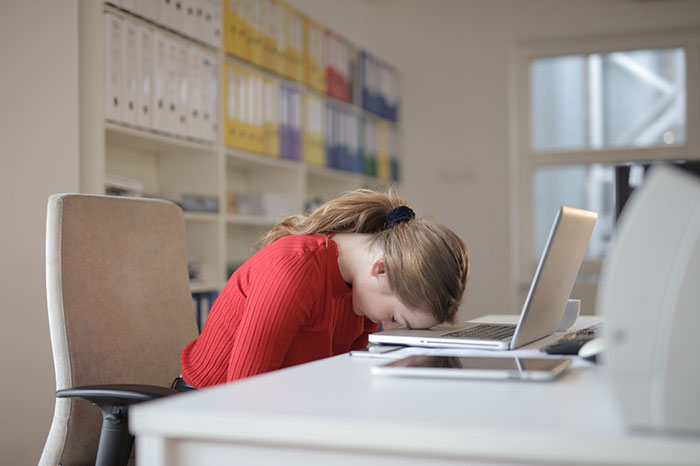
If anyone has restless sleep- or no sleep- frequently (due to stress or any health problem), he might have a sleep disorder. According to a survey, 1 in 3 adults has some sleep disorder in the United States. Many students could not get deep sleep regularly due to pressure, academic stress, or tight schedules. In other words, many people are not getting quality sleep at night, and it is very alarming.
Here is a brief detail of major sleep disorders.
Insomnia
Insomnia is the most common disorder. In this condition, the patient could not sleep or remain asleep for a long time. The most causes of insomnia include,
- Anxiety.
- Stress.
- Jet lag.
- Excessive noise.
- Excessive intake of caffeine or alcohol
- Depression.
About 10%-30% of adults suffer from insomnia, especially older people and women. Health specialists categorize insomnia into three types.
Chronic: In this condition, insomnia lasts for at least one month
Intermittent: When it occurs from time to time
Transient: When it occurs in just a few nights
According to sleep studies at the Health University of Utah, sleeping pills are not always the solution for chronic insomnia. If you have chronic insomnia, cognitive behavioral therapy works best.
Sleep Apnea
In this condition, a person suffers from breathlessness during sleep as the brain forgets to signal muscles to breathe during the night. It can make a person wake up in the middle of the night because of the inability to breathe. It is mainly of two types:
- Central Sleep Apnea: When the brain forgets to signal the body muscles to take in oxygen.
- Obstructive Sleep Apnea: Inability to breathe because of blocked airways.
Sleep apnea is usually diagnosed or ruled out with an overnight sleep study. However, you can also get a home sleep apnea test for minor symptoms.
Parasomnia
In this condition, the patient suffers from abnormal behaviors during sleep. These conditions include,
- Groaning.
- Nightmares.
- Teeth grinding
- Sleepwalking.
- Sleep talking
- Jaw clenching.
It is another most common sleep disorder that makes people unable to get restful sleep throughout the night.
Tips to Promote Healthy Sleep Pattern
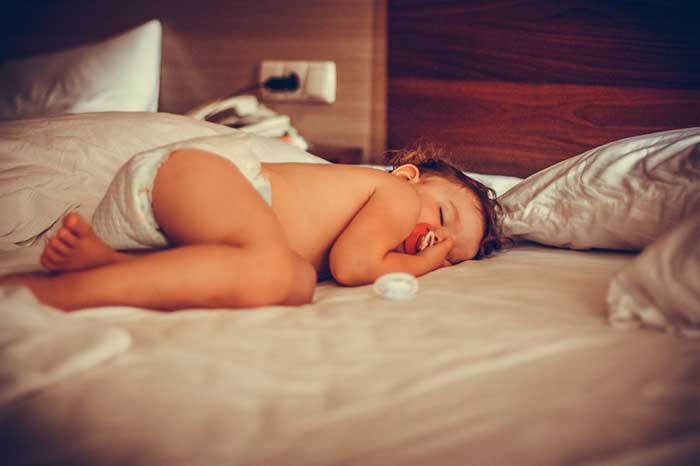
There can be a lot of reasons for a sleep disorder. Like from stress and anxiety to depression or any medical pain. Here are a few standard practices to encourage better sleep.
Maintain a Clean and Restful Environment
If you have difficulty falling asleep, clean your bedroom and turn it into a cozy place. Get a comfortable bed, as 93% of people consider a comfortable mattress important for sleep.
Try relaxation techniques like turning on the humidifier or listening to relaxing music. Also, practice mindfulness and meditation, such as yoga, and Taichi. Aromatherapy (lavender, chamomile) can help set the atmosphere sleep-friendly.
Avoid Caffeine
Caffeine keeps you awake. Try not to drink tea or coffee before bedtime. Also, change your eating habits. Do not eat spicy or fried meals before sleeping. Try not to drink alcohol as it promotes restlessness in sleep. Only by eating and drinking aptly can you prevent major causes of sleeping disorders.
Structure Your Sleep Schedule
Try setting a specific time to sleep and wake, and stick to it. Also, It is better not to prolong day naps. Increase daytime physical activities and set the evening for more relaxing activities.
Saying Goodbye To Electronics
89% of adults and 75% of children have at least one electronic device in their bedrooms. Electronics are the worst enemy of your sleep. These devices emit a blue light that decreases the melatonin (hormone responsible for your sleep) level in your body.
Shut down all devices about an hour before bedtime. If you cannot do that, try to listen to music, white noise, or an audiobook. It will calm you and limit screen use as well.
Healthy Sleep, Healthy Life!

For physical and emotional well-being, sleep plays an important role. Key factors such as maintaining a good diet, cutting junk food, and sticking to a specific sleep schedule can promote restful sleep. Other health benefits of getting deep sleep are,
Lower Risks of Heart Diseases
By getting a comfortable sleep, the body’s blood pressure regulates itself lowering the risk of getting heart diseases.
Strong Immune System
During sleep, the body regenerates, repair, and recover itself. It enhances the immune system to fight any possible disease that the body can get.
Emotional Well-being
According to a study conducted by the Journal of Sleep Research, emotional well-being is directly related to good quality sleep. When you do not get enough sleep at night, you get cranky or emotionally drained. Thus, good sleep is essential for both physical and mental health.
Ending Thoughts
How long does it take to fall asleep? About 10 to 20 minutes at bedtime!
You might fall asleep just in seconds of hitting the pillow due to a previous sleepless night. Or, it could take you long to sleep because of stress or occupying thoughts. This situation is non-threatening if it happens once in a blue moon. But if it is turning into a routine, consider your options. Try relaxing activities and sleeping therapies. Consult your doctor asap if the condition persists.
Having a relaxing sleep has more to do with how and when you go to bed. Build a consistent bedtime and start winding down an hour or before it. Keep a healthy lifestyle: diet and routine. Also, reading a book or writing before bed might help. Sweet dreams!


